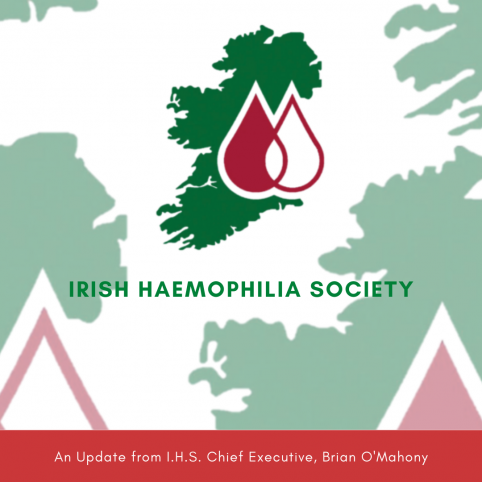EAHAD
We were very pleased to see that Mary Kavanagh, the Nurse specialist from Children’s Health Ireland at Crumlin has just been appointed as the new Chair of the European Association of Haemophilia and Allied Disorders (EAHAD) Nurses committee. This is well deserved as Mary has provided excellent care and expertise to children with haemophilia for many years. We wish her every success in this role.
Society Zoom meetings
The meetings organised by the Society on the Zoom platform have been very successful and well attended to date. The first 2 meetings on Covid -19 and the implications for haemophilia, with Dr. Beatrice Nolan and Dr. Niamh O Connell respectively as speakers each had approximately 40 attendees on each call and the third meeting earlier this week, where I gave a presentation on Haemophilia Care in Europe, had 50 attendees. We have just now completed a fun family quiz. A further Zoom meeting will take place next week on Hemlibra with Dr. Beatrice Nolan as speaker and parents as the target audience. A Zoom meeting for mothers is being organised for May 1st and on May 6th, we will have a topic aimed at adults.
In reflecting on the current and future impact of Covid -19 on Haemophilia care in Europe, there is a lot of uncertainty. Currently, the pandemic has had an impact on the comprehensive care infrastructure in some countries including Ireland. The haemophilia H and H ward in St. James hospital is temporarily a Covid-19 treatment unit. In broader terms, we have seen the public health system integrating private hospital beds for an initial 5-month period. It will be interesting to see the long-term impact of this and if we may see some re-thinking of our two-tier health service.
GP’s and hospitals have been issuing electronic prescriptions to pharmacies which is an obvious move which perhaps should have been in place prior to this. It seems ridiculous that many prescriptions prior to this were still being sent by fax! The pandemic has accelerated the use of technology. Prior to this the National Coagulation Centre (NCC) had started to use telemedicine or phone consultations for some people with mild haemophilia or von Willebrand’s disorder. This has now been expanded to include people with severe haemophilia.
The NCC and CHI, Crumlin are both proceeding with out- patient reviews by phone and NCC are also now offering the option of video consultations. This is innovative, timely, very welcome and I believe will persist after the pandemic. If a person with a severe bleeding disorder is routinely asked to attend 2 review clinics per year, it would seem a very practical option in the future that one of those visits could be carried out remotely by phone or video call and the second would be an in-person visit which could perhaps also include the annual blood tests required. The clinical teams are also utillising platforms such as zoom, Skype or Microsoft Teams for their team meetings. New ways of working from home are being developed. As the social isolation measures will almost certainly last in some form for a considerable period of time, we will all have to learn new ways of communicating and adapting, new ways of working and new ways of maintaining our strong community.
Stay safe.
Brian O’Mahony
Chief Executive
